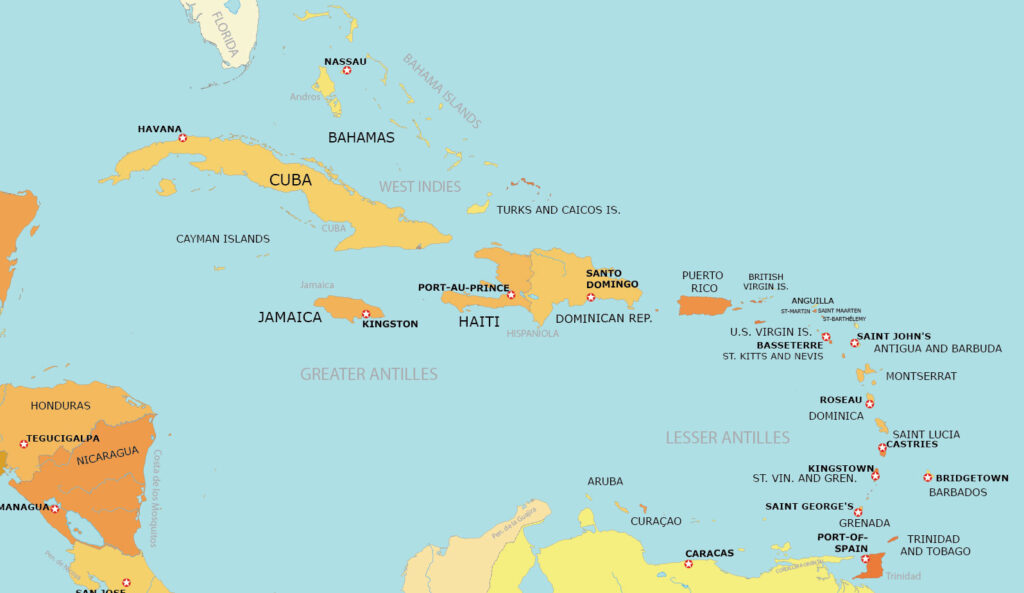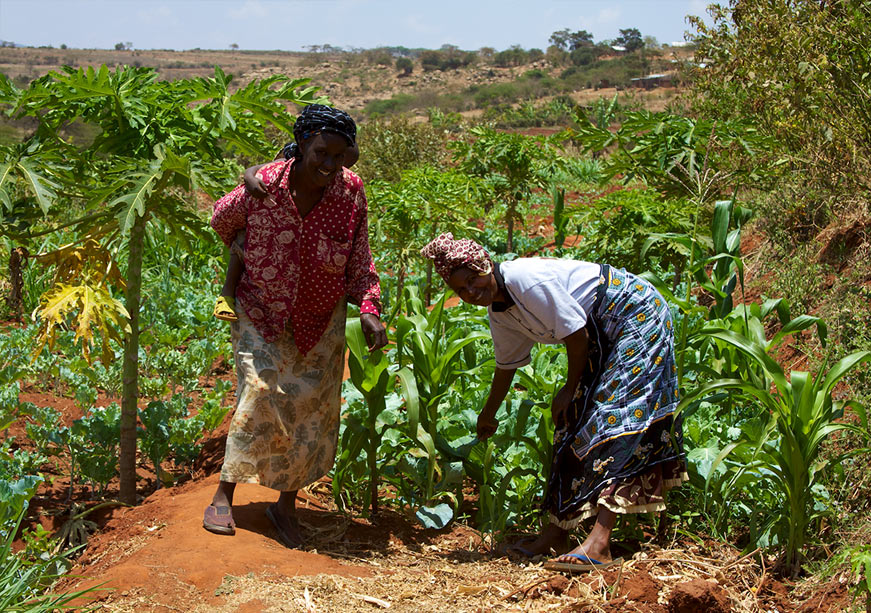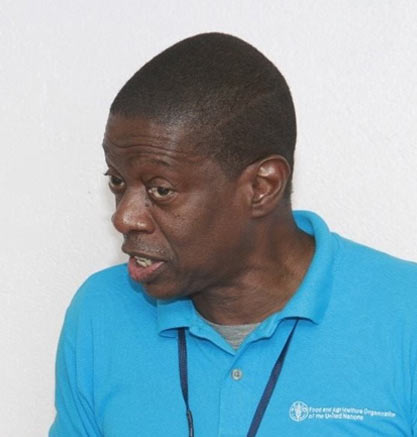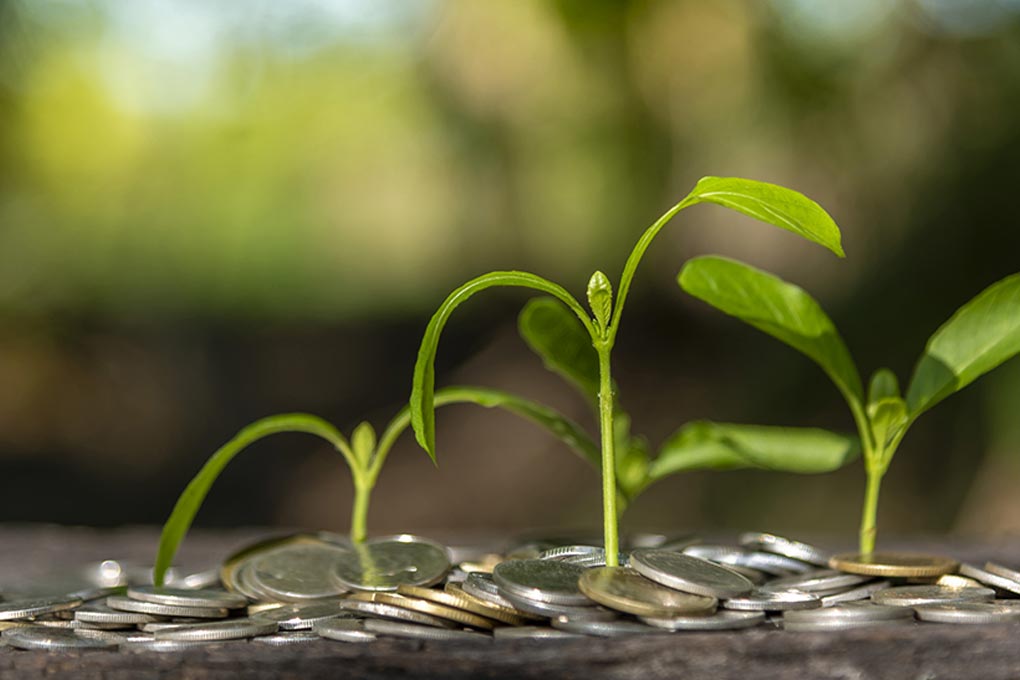This paper examines how smallholder farmers in the Eastern Caribbean are building climate resilience through adaptive practices, regional policies, and innovative financial and technological solutions, offering lessons for Small Island Developing States worldwide.
Introduction
The Caribbean Small Island Developing States (CSIDS) contribute a mere 0.23 percent of total Greenhouse Gas Emissions, yet bear the brunt of the devastating impacts of climate change. The Eastern Caribbean (EC) region, as part of SIDS worldwide, comprises small islands, namely, Antigua and Barbuda, Barbados, Dominica, Grenada, Saint Lucia, St. Kitts and Nevis, and St. Vincent and the Grenadines (Figure 1). Agriculture is important for these economies, accounting for a significant portion of employment in the wider Caribbean, ranging from 10 percent to 25 percent, estimated at 23 percent regionally.
Figure 1: Map of the Eastern Caribbean Region

Source: GIS Geography
Due to their location, these islands face increasing vulnerability to climate change and natural hazards. All sectors have been negatively impacted, but farming has suffered most from stronger tropical cyclones, devastating landslides, erratic rainfall, floods, droughts, saltwater intrusion, and extreme heat. Estimated average losses from hurricanes range from 9 percent to 43 percent of gross domestic product (GDP). In 2017, Hurricane Maria caused US$931 million in total damages in Dominica, and losses of US$382 million, which accounted for 226 percent of the country’s 2016 GDP.
Farms are highly vulnerable, and past traumatic events have caused significant losses in developing economies, severely impacting farmers, farm workers, and their families. Farmers must adapt to climate change by altering their behaviours and practices. Without adaptation, all aspects of food security, availability, accessibility, utilisation, and stability will be severely affected.
Farmers have not given up but have instead demonstrated resilience in the face of challenges, continuing to farm and provide for their families and nations. Numerous examples of farmer resilience exist across the EC. The term ‘resilience’ has been described as “plastic” due to its context-dependent meanings. For this discussion on the effects of climate change on small farmers, we adopt Abramson’s (2014) definition: the ability to withstand, adapt, or recover quickly from a disaster.
While this paper highlights examples of resilience in EC countries, it holds importance for other SIDS around the world. Dhanani described the significant similarities of impacts on SIDS around the world in some detail. On that premise, we posit that the policies discussed herein to help struggling farmers and farm communities become more resilient to existential threats can be appropriate for all SIDS.
Socioeconomic Profile and Conditions of EC Small Farmers
Farmers in the EC are typically men aged 41-54 years, managing two hectares or less. While men dominate, women are crucial, making up 30 percent of registered farm holders and contributing significantly to production, marketing, and processing. These farms employ mixed crop-livestock systems, relying on family labour for subsistence and local commercial sales.
Country vulnerability stems from geographic features, dense coastal populations, infrastructure gaps and government preparedness. EC farms, often on hillsides, undulating terrain, or fertile coastal lands, are highly vulnerable to daily weather changes and lack adequate infrastructure like drains, water storage, and controlled environment systems. Shrinking fishing areas compel fisherfolk to venture further and extend their time at sea, leading to increased consumer costs.
Examples of Resilience-Building Activities
Regional strategies, for example, the Organisation of Eastern Caribbean States (OECS) Food and Agriculture Systems Transformation (FAST) Strategy, and the OECS Growth and Development Strategy, 2018-2027, strongly advocate for integrating climate resilience into strategic development plans. These policies support the deployment of innovative adaptation solutions, ranging from irrigation systems to disaster risk reduction. Additionally, the Eastern Caribbean Regional Climate Change Implementation Plan provides a roadmap for OECS member states to reduce emissions, accelerate green growth, deliver development co-benefits, and improve resilience to climate change impacts. Despite existing gaps in policy coordination at the regional and national levels, these regional plans have spurred actionable results in Eastern Caribbean countries.
Dominica aims to become the world’s first climate-resilient nation. It deploys funding from the World Bank-funded Disaster Vulnerability Reduction Project to focus on resilient infrastructure and enhanced hazard data collection and monitoring. Key initiatives focus on improving water pressure and irrigation through reinforced concrete water tanks, supporting farmers and fisherfolk in restoring production with climate-smart technologies, and constructing resilient homes for vulnerable communities.
St Lucia is making significant strides in climate adaptation, as elaborated in its Sectoral Adaptation Strategies and Action Plan, 2018-2028. This key component of St. Lucia’s National Adaptation Plan has identified 45 priority climate adaptation measures and concepts for alternative water solutions, and supports a climate-resilient agriculture demonstration centre. The Belle Vue Farmer’s Cooperative has successfully adopted and is expanding climate-smart practices, including drip irrigation, natural mulching to promote soil fertility, and powering water pumps. With support from the Green Climate Fund, progress is being made on reforestation and wetland restoration, which contributes to water security and agricultural productivity. To support these efforts, the Climate Adaptation Financing Facility, a US$5 million fund managed by the St. Lucia Development Bank, has disbursed approximately US$2.3 million in concessional loans that support risk reduction for vulnerable households and businesses, with women being the beneficiaries of 58 percent of these funds.
Grenada has adopted a multi-faceted approach to supporting climate resilience for smallholder farmers. Climate-smart agriculture practices being implemented include improved irrigation and water management systems, improved soil management, crop diversification and improved livestock management. Funding for climate resilience is provided through a US$4.6 million fund from the Global Environment Facility; the Green Climate Fund, in collaboration with GIZ, is supporting climate resilience for the water sector; and the Grenada Development Bank offers small loans of up to US$2,000 to start-ups and farmers for digital innovations. The Caribbean Catastrophe Risk Insurance Facility (CCRIF) provides insurance against earthquakes, hurricanes and excessive rainfall, thereby augmenting agricultural resilience. The COAST insurance programme also provides parametric insurance to individuals in the fisheries industry in both Grenada and St. Lucia.
The Caribbean Small Island Developing States (CSIDS) multi-country soil management initiative, known as the SOILCARE project, directly and indirectly supports the resilience of smallholder farmers in the EC. It equips them with enhanced tools and knowledge for climate adaptation and sustainable land management. The project has advanced national soil data and high-resolution mapping in Grenada and Barbados, and successfully championed climate-smart agriculture. This includes demonstrated techniques such as organic mulching, drip irrigation, water storage, and integrated pest management on model farms in Grenada and St. Lucia.
In several EC nations, SOILCARE introduced the Climate-Smart Agriculture Compliant (C-SAC) tool, a tested, indigenous, regional certification and labelling protocol to furnish verifiable metrics and standardise certification of climate-smart agriculture. The tool has received endorsement from Ministers of Agriculture in the Caribbean. The C-SAC web-based App is currently employed for farmer self-assessments and for training agricultural extension staff and farmers.
While reactive initiatives are good, sustainable, resilient efforts must be embraced. The University of the West Indies has launched a Post-graduate Diploma in Climate Resilient Agricultural Extension for Community Development, targeting these EC countries. This programme aims to equip staff to become technology stewards of climate change adaptations and to improve communication with communities. The Inter-American Institute for Cooperation on Agriculture (IICA) completed an assessment of regional extension systems as a prerequisite to planning targeted extension system reform to meet current realities.
Policy Implications and Recommendations
The OECS emphasises strategies and policies that improve production techniques, incorporate nature-based solutions, promote technology adoption, and enhance market stability. The C-SAC certification tool is vital for identifying and promoting genuine climate-smart initiatives and preventing “greenwashing.” Financial innovations such as weather-indexed insurance, community adaptation funds, and blended finance instruments have been introduced and are unlocking capital for smallholder adaptation. However, the realities point to an urgent need for increased farmer-centred policies integrating climate resilience, digital inclusion, and extension reform.
Our strategic policy recommendations prioritise harmonising regional and national policies and accelerating their implementation. We advocate for investing in scientific research and data for adaptive strategies, reforming agricultural extension services for smallholder farmers, and expanding climate-resilient financial resources for vulnerable producers. A unified effort is needed to promote and adopt climate-smart practices and technologies, including digital tools for smallholder farmers.
Closing policy and implementation gaps, investing in innovative financing and capacity building and deepening regional integration are crucial for empowering smallholder farmers and ensuring sustainable development in the EC.
Conclusion
Smallholder farmers in the EC face an existential threat from climate change, including storms, intense rainfall, droughts, and sea-level rise. Their adaptive strategies offer crucial lessons for other SIDS globally. The EC’s approach, characterised by targeted investments in financial instruments like parametric insurance and climate adaptation funds, supported by strong regional institutions and the adoption of climate-smart certification tools, holds value for consideration for implementation by other SIDS. Vulnerable nations can transition from being victims to leaders in adaptive responses. Such an action will foster equitable climate resilience that prioritises smallholder farmers and vulnerable communities. In closing, we fully recognise that success in the Caribbean and SIDS worldwide requires the continued involvement of international partners, regional organisations, and local communities to ensure sustainable and climate-resilient futures for generations to come.
Wayne Ganpat is an International Agricultural Development Consultant with over 25 years of experience in the Caribbean and internationally. He is Professor of Agricultural Extension and former Dean of the Faculty of Food and Agriculture at the University of the West Indies, Trinidad and Tobago.
Steve Maximay is the Managing Director of Science-based Initiatives, and the Trademark Owner/Licensor of the Climate-Smart Agriculture Compliant (C-SAC) tool and label.
Howard Batson is an International Development Consultant with over 25 years of experience in agricultural development, agribusiness, climate-smart agriculture, and environmental management.













